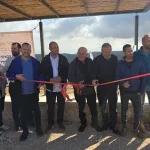Jerusalem, 22 October, 2025 (TPS-IL) — The Knesset advanced two contentious bills on Wednesday in preliminary readings that seek to apply Israeli sovereignty to territories in Judea, Samaria, and Ma’ale Adumim, defying strong opposition from the United States. The vote came during a visit by U.S. Vice President J.D. Vance, highlighting tensions between Prime Minister Benjamin Netanyahu and his coalition partners.
One bill, proposed by MK Avi Maoz, chairman of the Noam Party, would extend Israeli sovereignty to all Area C of Judea and Samaria. His measure passed narrowly by a vote of 25-24. Likud MK Yuli Edelstein’s decisive vote in favor contradicted Netanyahu’s request to postpone the legislation.
“The State of Israel is a sovereign state, and this is a time of sovereignty,” Maoz said, explaining his refusal to delay the bill despite Netanyahu’s objections.
In parallel, MK Avigdor Liberman of the right-wing opposition Yisrael Beiteinu party submitted a separate bill to only extend sovereignty to Ma’ale Adumim, a city northeast of Jerusalem with more than 50,000 residents. Liberman’s bill passed by a vote of 32-9.
“I call on the Israeli government to stop engaging in evasion, and start engaging in sovereignty! The Bibi-Tibi coalition has slowed down every time. I hope that this time those who call themselves ‘right wing’ will come to their senses and vote correctly,” Liberman said.
Ahead of the vote, coalition Chairman MK Ofir Katz appealed to MKs not to vote on either measure.
“Sovereignty is not achieved through opposition legislation, and certainly not at a time when we are working with our American friends to achieve all the goals of the war, including the dismantling of Hamas and the demilitarization of Gaza. At the same time, I have received requests not to vote against it. Therefore, the faction’s position is not to vote at all on the laws that will be raised today,” Katz said.
Despite these instructions, several coalition members, including Religious Zionism, Otzma Yehudit, and Edelstein, supported the bills, creating an internal embarrassment for Netanyahu. Maoz had originally planned to raise the bill last summer, but postponed ]it after senior coalition officials warned that a failed vote would prevent reconsideration for six months.
The legislation drew criticism from Degel Hatorah, a Haredi Orthodox party, which warned that such moves risked international backlash. “The proposals to declare sovereignty at this time put us in conflict with the countries of the world, and especially with the United States, which is a kingdom of mercy,” the party said.
Support for the bills came mainly from right-wing and religious factions. Opposition members and parts of the coalition refrained from voting to avoid direct confrontation.
The Oslo Accords divided Judea and Samaria into Areas A, B, and C. Sovereignty would apply to Area C, where all of Judea and Samaria’s Jews live, and where Israel has administrative and security jurisdiction. In Area A, the Palestinian Authority maintains administrative and security responsibility. In Area B, the Palestinian Authority has administrative jurisdiction, but Israel maintains responsibility for security.
Area C makes up 60 percent of the territory of Judea and Samaria.
Leaders of Jewish communities in Judea and Samaria have expressed hope that U.S. President Donald Trump will revisit the issue of applying Israeli law to Area C of Judea and Samaria.






























